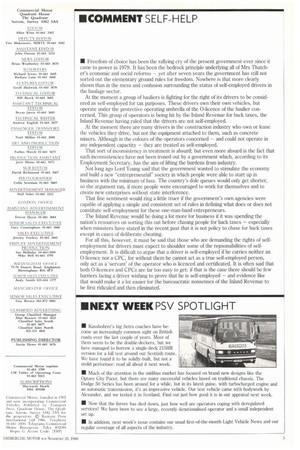• COMMENT SELF-HELP
Page 5

If you've noticed an error in this article please click here to report it so we can fix it.
• Freedom of choice has been the rallying cry of the present government ever since it came to power in 1979. It has been the bedrock principle underlying all of Mrs Thatcher's economic and social reforms — yet after seven years the government has still not sorted out the elementary ground rules for freedom. Nowhere is that more clearly shown than in the mess and confusion surrounding the status of self-employed drivers in the haulage sector.
At the moment a group of hauliers is fighting for the right of its drivers to be considered as self-employed for tax purposes. These drivers own their own vehicles, but operate under the protective operating umbrella of the 0-licence of the haulier concerned. This group of operators is being hit by the Inland Revenue for back taxes, the Inland Revenue having ruled that the drivers are not self-employed.
At the moment there are many drivers in the construction industry who own or lease the vehicles they drive, but not the equipment attached to them, such as concrete mixers. Although in the colours of the operators concerned — and could not operate in any independent capactity — they are treated as self-employed.
That sort of inconsistency in treatment is absurd; but even more absurd is the fact that such inconsistencies have not been ironed out by a government which, according to its Employment Secretary, has the aim of lifting the burdens from industry.
Not long ago Lord Young said that the government wanted to stimulate the economy and build a new "entrepreneurial" society in which people were able to start up in business with the minimum of fuss. The country's dole queues would only get shorter, so the argument ran, if more people were encouraged to work for themselves and to create new enterprises without state interference.
That fine sentiment would ring a little truer if the government's own agencies were capable of applying a simple and consistent set of rules in defining what does or does not constitute self-employment for these one-man-band entrepreneurs.
The Inland Revenue would be doing a lot more for business if it was spending the nation's resources on sorting this out before chasing people for back taxes — especially when ministers have stated in the recent past that it is not policy to chase for back taxes except in cases of deliberate cheating.
For all this, however, it must be said that those who are demanding the rights of selfemployment for drivers must expect to shoulder some of the repsonsibilities of selfemployment. It is difficult to argue that a driver is self-employed if he carries neither an 0-licence nor a CPC, for without them he cannot act as a true self-employed person, only act as a 'servant' of the operator who is licenced and certificated. It is often said that both 0-licences and CPCs are far too easy to get: if that is the case there should be few barriers facing a driver wishing to prove that he is self-employed — and evidence like that would make it a lot easier for the bureaucratic nonsenses of the Inland Revenue to be first ridiculed and then eliminated.
























































































































